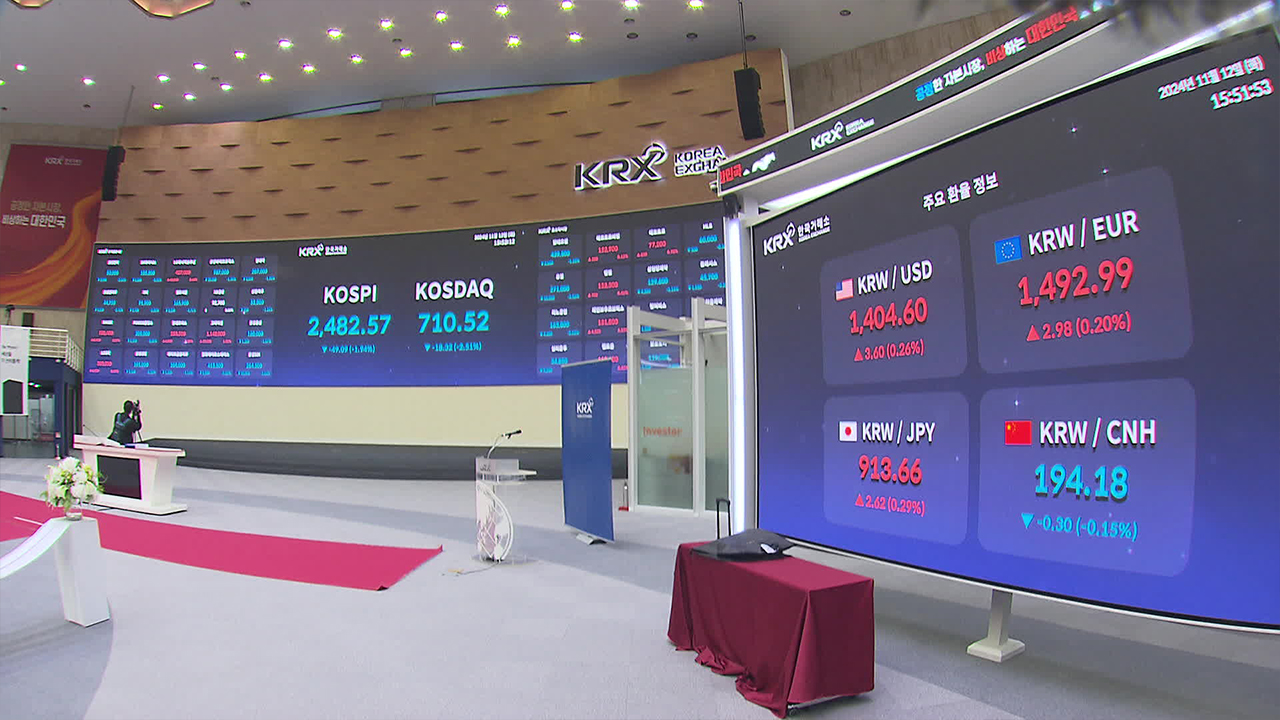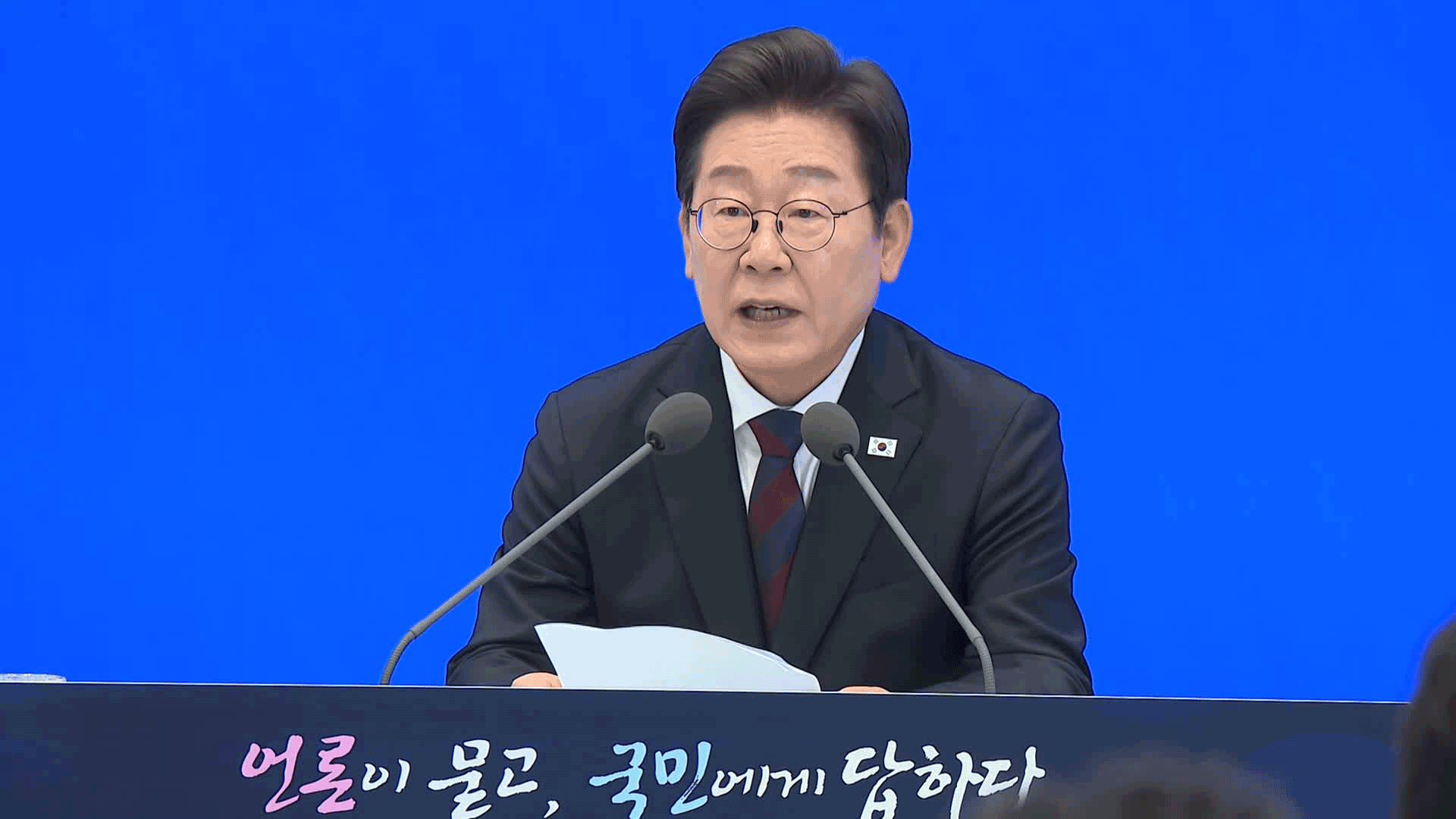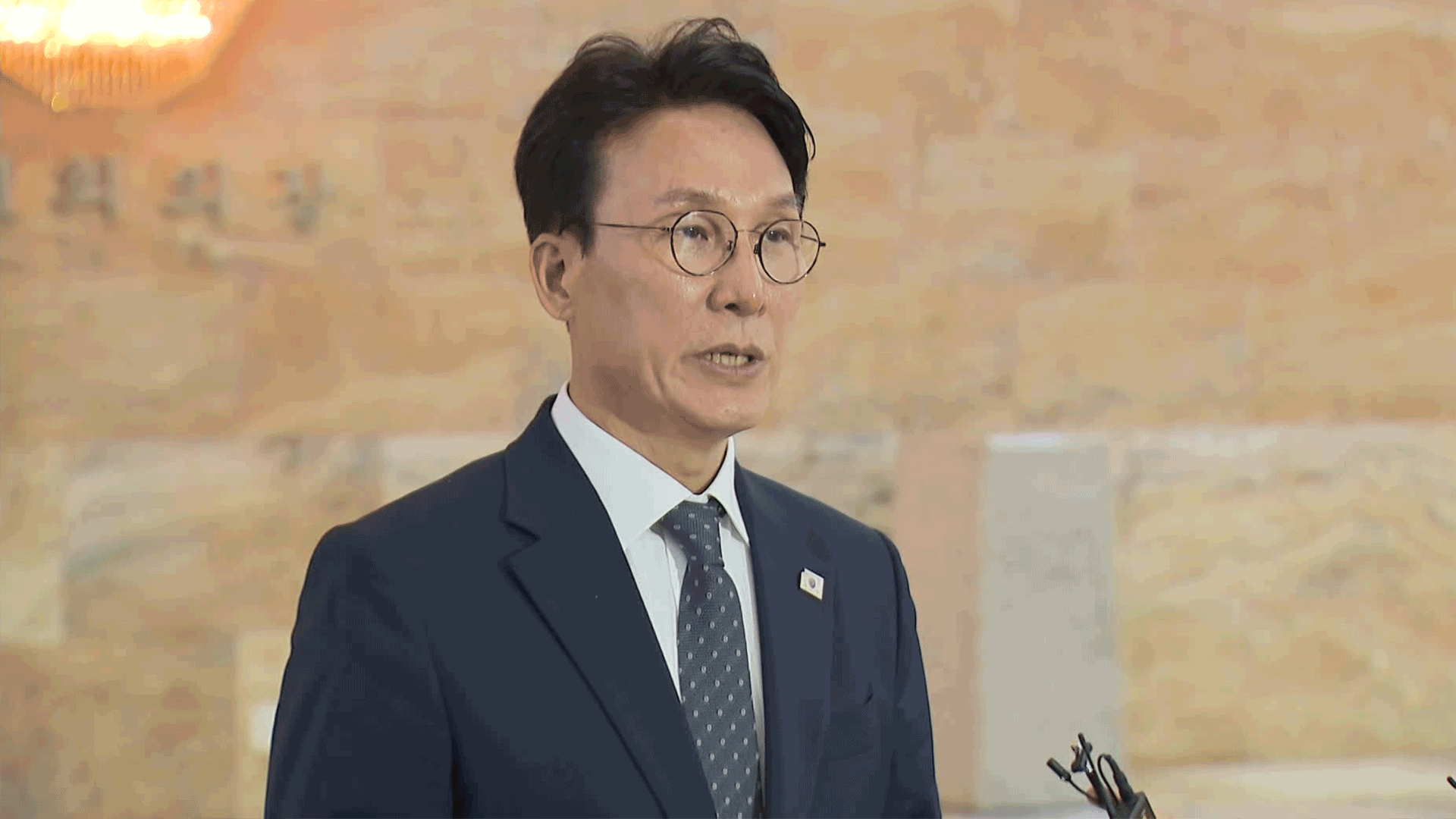Korean won hits 2-year low on Trump effect
입력 2024.11.13 (03:45)
읽어주기 기능은 크롬기반의
브라우저에서만 사용하실 수 있습니다.
[Anchor]
Today (11.12), the won-dollar exchange rate has surpassed 1,400 won.
Since Trump's election, the strength of the dollar has become more pronounced, and concerns about the semiconductor industry have compounded, causing the KOSPI to fall below the 2,500 mark for the first time in three months.
This is a report by Hwang Kyung-joo.
[Report]
The won/dollar exchange rate closed the week at 1,403.50 won, surpassing the psychological resistance level of 1,400 won.
As of the closing price at 3:30 PM, this is the highest level in two years.
Countries like Taiwan, which, like us, export a lot of semiconductors to the U.S., and Mexico, which suffered economically during the first Trump administration, have also seen their exchange rates rise.
This is due to growing concerns that tariff increases from the second Trump administration will push up prices and interest rates, fueling a strong dollar.
[Moon Jeong-hee/Researcher at KB Kookmin Bank: "With news that the House of Representatives has also been won by the U.S. Republican Party, it seems that there is an expectation that Trump's policies will be further strengthened. I think it is reflecting about 70-80% of the start of the Trump administration (in advance)..."]
The so-called 'Trump trade' phenomenon, where money flows into the U.S. stock market and virtual assets, is becoming increasingly pronounced.
While the three major indices in New York have reached all-time highs, concerns about the semiconductor export slump, along with the 'strong dollar,' have caused the KOSPI to close at the 2,500 mark for the first time in three months.
[Seo Sang-young/Researcher at Mirae Asset Securities: "Concerns about the (U.S.-China) trade dispute, and worries about the peak of the semiconductor industry are combining to push our stock market down..."]
The shift in U.S. trade policy is also adding pressure to the stock market, as concerns grow over Korean companies that rely heavily on exports to the U.S.
This is KBS News, Hwang Kyung-joo.
Today (11.12), the won-dollar exchange rate has surpassed 1,400 won.
Since Trump's election, the strength of the dollar has become more pronounced, and concerns about the semiconductor industry have compounded, causing the KOSPI to fall below the 2,500 mark for the first time in three months.
This is a report by Hwang Kyung-joo.
[Report]
The won/dollar exchange rate closed the week at 1,403.50 won, surpassing the psychological resistance level of 1,400 won.
As of the closing price at 3:30 PM, this is the highest level in two years.
Countries like Taiwan, which, like us, export a lot of semiconductors to the U.S., and Mexico, which suffered economically during the first Trump administration, have also seen their exchange rates rise.
This is due to growing concerns that tariff increases from the second Trump administration will push up prices and interest rates, fueling a strong dollar.
[Moon Jeong-hee/Researcher at KB Kookmin Bank: "With news that the House of Representatives has also been won by the U.S. Republican Party, it seems that there is an expectation that Trump's policies will be further strengthened. I think it is reflecting about 70-80% of the start of the Trump administration (in advance)..."]
The so-called 'Trump trade' phenomenon, where money flows into the U.S. stock market and virtual assets, is becoming increasingly pronounced.
While the three major indices in New York have reached all-time highs, concerns about the semiconductor export slump, along with the 'strong dollar,' have caused the KOSPI to close at the 2,500 mark for the first time in three months.
[Seo Sang-young/Researcher at Mirae Asset Securities: "Concerns about the (U.S.-China) trade dispute, and worries about the peak of the semiconductor industry are combining to push our stock market down..."]
The shift in U.S. trade policy is also adding pressure to the stock market, as concerns grow over Korean companies that rely heavily on exports to the U.S.
This is KBS News, Hwang Kyung-joo.
■ 제보하기
▷ 카카오톡 : 'KBS제보' 검색, 채널 추가
▷ 전화 : 02-781-1234, 4444
▷ 이메일 : kbs1234@kbs.co.kr
▷ 유튜브, 네이버, 카카오에서도 KBS뉴스를 구독해주세요!
- Korean won hits 2-year low on Trump effect
-
- 입력 2024-11-13 03:45:50

[Anchor]
Today (11.12), the won-dollar exchange rate has surpassed 1,400 won.
Since Trump's election, the strength of the dollar has become more pronounced, and concerns about the semiconductor industry have compounded, causing the KOSPI to fall below the 2,500 mark for the first time in three months.
This is a report by Hwang Kyung-joo.
[Report]
The won/dollar exchange rate closed the week at 1,403.50 won, surpassing the psychological resistance level of 1,400 won.
As of the closing price at 3:30 PM, this is the highest level in two years.
Countries like Taiwan, which, like us, export a lot of semiconductors to the U.S., and Mexico, which suffered economically during the first Trump administration, have also seen their exchange rates rise.
This is due to growing concerns that tariff increases from the second Trump administration will push up prices and interest rates, fueling a strong dollar.
[Moon Jeong-hee/Researcher at KB Kookmin Bank: "With news that the House of Representatives has also been won by the U.S. Republican Party, it seems that there is an expectation that Trump's policies will be further strengthened. I think it is reflecting about 70-80% of the start of the Trump administration (in advance)..."]
The so-called 'Trump trade' phenomenon, where money flows into the U.S. stock market and virtual assets, is becoming increasingly pronounced.
While the three major indices in New York have reached all-time highs, concerns about the semiconductor export slump, along with the 'strong dollar,' have caused the KOSPI to close at the 2,500 mark for the first time in three months.
[Seo Sang-young/Researcher at Mirae Asset Securities: "Concerns about the (U.S.-China) trade dispute, and worries about the peak of the semiconductor industry are combining to push our stock market down..."]
The shift in U.S. trade policy is also adding pressure to the stock market, as concerns grow over Korean companies that rely heavily on exports to the U.S.
This is KBS News, Hwang Kyung-joo.
Today (11.12), the won-dollar exchange rate has surpassed 1,400 won.
Since Trump's election, the strength of the dollar has become more pronounced, and concerns about the semiconductor industry have compounded, causing the KOSPI to fall below the 2,500 mark for the first time in three months.
This is a report by Hwang Kyung-joo.
[Report]
The won/dollar exchange rate closed the week at 1,403.50 won, surpassing the psychological resistance level of 1,400 won.
As of the closing price at 3:30 PM, this is the highest level in two years.
Countries like Taiwan, which, like us, export a lot of semiconductors to the U.S., and Mexico, which suffered economically during the first Trump administration, have also seen their exchange rates rise.
This is due to growing concerns that tariff increases from the second Trump administration will push up prices and interest rates, fueling a strong dollar.
[Moon Jeong-hee/Researcher at KB Kookmin Bank: "With news that the House of Representatives has also been won by the U.S. Republican Party, it seems that there is an expectation that Trump's policies will be further strengthened. I think it is reflecting about 70-80% of the start of the Trump administration (in advance)..."]
The so-called 'Trump trade' phenomenon, where money flows into the U.S. stock market and virtual assets, is becoming increasingly pronounced.
While the three major indices in New York have reached all-time highs, concerns about the semiconductor export slump, along with the 'strong dollar,' have caused the KOSPI to close at the 2,500 mark for the first time in three months.
[Seo Sang-young/Researcher at Mirae Asset Securities: "Concerns about the (U.S.-China) trade dispute, and worries about the peak of the semiconductor industry are combining to push our stock market down..."]
The shift in U.S. trade policy is also adding pressure to the stock market, as concerns grow over Korean companies that rely heavily on exports to the U.S.
This is KBS News, Hwang Kyung-joo.
-
-

황경주 기자 race@kbs.co.kr
황경주 기자의 기사 모음
-
이 기사가 좋으셨다면
-
좋아요
0
-
응원해요
0
-
후속 원해요
0











![[단독] 도이치 주포 “김건희, 내 덕에 떼돈 벌어…22억 원 주문”](/data/news/2025/07/03/20250703_KpuU43.png)
![[단독] “쪽지 얼핏 봤다, 안 받았다”더니…CCTV에선 문건 챙긴 이상민](/data/news/2025/07/03/20250703_Lv3LjI.png)


이 기사에 대한 의견을 남겨주세요.